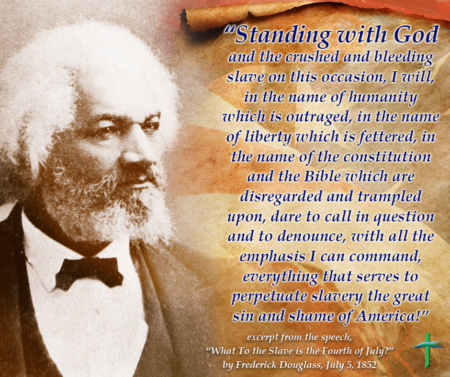Frederick Douglass’ scathing 1852 reflection on Independence Day serves as timeless call for justice and equality in today’s America
VALLEY FORGE, PA (07/02/2024)—“What, to the American slave, is your 4th of July? I answer; a day that reveals to him, more than all other days in the year, the gross injustice and cruelty to which he is the constant victim. To him, your celebration is a sham; your boasted liberty, an unholy license; your national greatness, swelling vanity; your sound of rejoicing are empty and heartless; your denunciation of tyrants brass fronted impudence; your shout of liberty and equality, hollow mockery; your prayers and hymns, your sermons and thanks-givings, with all your religious parade and solemnity, are to him, mere bombast, fraud, deception, impiety, and hypocrisy — a thin veil to cover up crimes which would disgrace a nation of savages. There is not a nation on the earth guilty of practices more shocking and bloody than are the people of the United States, at this very hour.”

Frederick Douglass and excerpt from his July 1852 Independence Day speech.
Philip S. Foner, who assembled the most significant of Douglass’ hundreds of speeches, letters, articles and editorials between 1950 and 1975 into a five-volume compilation, called this fragment of Douglass’s speech “probably the most moving passage in all of Douglass’ speeches.”
On July 5, 1852, Douglass spoke at a celebration held at the Corinthian Hall in his hometown of Rochester, New York, to honor the signing of the Declaration of Independence. He delivered a damning speech, telling the audience, “This Fourth of July is yours, not mine. You may rejoice, I must mourn.” He continued, “Do you mean, citizens, to mock me, by asking me to speak to-day?”
Douglass bravely called out white supremacy as a foundation of the United States. Although he praises ideals that the Founding Fathers aspired to, he criticizes the country for its flagrant hypocrisy and violation of these ideals in preserving the system of slavery.
He recognized the role of religion in enabling and excusing slavery in theological and practical ways. Douglass argued that genuine Christians should not watch silently as the freedoms and rights of others are taken away. Criticizing churches for abandoning their own Christian principles, he found it outrageous that different denominations across the country had manifested a lack of accountability and apathy regarding slavery. In Douglass’ view, the defense of slavery by churches was worse than a lot of other things that were prohibited at the time, such as plays and literature that were seen as promoting blasphemy and indecency.
Douglass’s speech was prophetic. In 2024, as millions in the United States prepare to celebrate Independence Day, Black Americans, Native Americans, religious minorities, immigrants and LGBTQ+ folks are still surviving an unequal, exploitative legal, social and economic system. The notion of “religious liberty” has been weaponized and used to violate the rights of many U.S. citizens. This played out recently when Louisiana mandated the display of the Ten Commandments in public school classrooms and Oklahoma’s superintendent of public instruction, Ryan Walters, ordered the teaching of the Bible in grades 5-12 in public schools.
In 2020, on the 168th anniversary of Frederick Douglass’ famous speech in Rochester, a statue of the abolitionist erected there in 2018 to mark the 200th anniversary of his birth was torn from its plinth and vandalized. For the perpetrators, no doubt incensed by the removal of the Confederate statues across the country, Douglass’ ability to speak truth to power was unbearable. But the power of visionaries does not lie in statues; it remains in their words and actions that inspire future generations.
Douglass would likely agree with the Jewish poet Emma Lazarus, who once wrote: “None of us are free until all of us are free.” And, for now, none of us are free, no matter how many fireworks we set off.
By Rev. Dr. Anna Piela, senior writer at ABHMS and assistant editor of The Christian Citizen.

